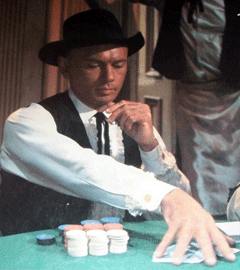|
|
Progress Publishing Co. |
|
|
Poker Betting |
|
|
Progress Publishing Co. |
|
|
Poker Betting |

![]()

![]()
Poker Betting
*******************************************************************
Betting structure in Texas Holdem Poker
The difference in betting structure between poker and other casino games
The characteristics of the betting structure in Texas Holdem Poker
Gradual, sequential and non-uniform betting structure
How the betting structure affects poker player’s betting
Betting structure and the evaluation of the true strength of the poker player’s hand
*******************************************************************
Betting Structure in Texas Holdem Poker
The betting structure of the Texas Holdem Poker is different in many ways from other casino games. Blackjack, Baccarat, Roulette etc. players make their betting before the playing round begins. The betting is done in its entirety and finished before the start of the action. In poker on the other hand, betting follows the action. The cards are first dealt to all the players at the table who examine their cards and only then they decide to proceed or not with their betting.
The characteristics of the betting structure in Texas Holdem Poker
Betting in poker is gradual. It’s not done at once for the total amount. It’s done step-by-step on every stage (“street”) of the poker round – “pre-flop”, “flop”, “turn” and “river”. The player’s betting can stop on every street if he chooses to leave the contest, but it must be finished on the river if a player decides to go to the “showdown”.
Poker’s betting structure is sequential. A poker player’s total betting consists of a sequence of bets, which starts pre-flop and ends on the river. A bet can be missed on a certain street if all the players check and nobody bets. Flop, turn and river bring new “community” cards, which in combination with the two initial player’s cards develop the final strength of a poker player’s hand. A player decides to stop or continue his betting sequence according to changes in his hand relative strength caused by the community cards on the board.
The poker betting structure is also non-uniform. The betting sequence is not made of the same size bets on every street of the poker round. The size of the bet is the same pre-flop and on the flop. However, on the turn and river the bet size is doubled.
How the betting structure affects poker player’s betting
The peculiar nature of the poker sequential and non-uniform betting affects the way many poker players make their plying decisions. Their decisions often are not based on the realistic evaluation of the relative strength of their hands but rather on factors which are less relevant and secondary in nature. The flop is the good place to illustrate that point. Since the flop requires a bet two times smaller than the turn and river bets, it creates a perception of the flop as the “cheap” street. Because it’s cheap, many poker players decide on the flop to stay to see the turn card. They often do it not because their hand justifies that, but because the price to see the turn is perceived to be cheap. Also the poker players know that after the flop there are still two more cards coming, which can drastically improve their hand’s relative strength. In result the often present wishful thinking on behalf of the poker players, may create a false hope to substitute a rationale. The players may continue to stay in the pot and continue betting because of that wishful thinking, when logical approach based on correct evaluation of the hand strength and the relation between the “outs” and the “pot odds” would have told them otherwise.
Betting structure and the evaluation of the true strength of the poker player’s hand
The perception of the flop being a cheap street and a perspective of two more cards coming that may improve a poker hand promote betting, which may not reflect the true strength of the poker hand. It happens so often and to such extent that many poker players consider a flop to be a “phony” betting street. For ex. a poker player out of position may check and call on the flop with his weak hand, only because it’s “cheap” to see the turn. His betting is not indicative of his hand’s strength but of the specifics of the flop. He may raise the field from late position just with draw again only because it’s ‘cheap”, he can buy a “free” card on the turn and two cards from the turn and river may complete his drawing hand. A poker player may also check and call with his very strong hand on the flop, just to go for a check-raise on the turn because the turn bet is twice the size of the flop bet. He’ll get more money in the pot by delaying his check-raise on the flop to make it on the turn instead etc….
Copyright Progress Publishing Co.
Selected References:
| David Sklansky Mason Malmuth Holdem Poker | Phil Hellmuth Jr Play Poker Like the Pros |
| Ed Miller David Sklansky Small Stakes Holdem Poker | Doyle Brunson Super System - A Course in Power Poker |
| David Sklansky The Theory of Poker | Dan Harrington Harrington on Poker |
| Lee Jones Winning Low Limit Texas Holdem Poker | John Vorhaus Killer Poker |
| Ken Warren Ken Warren Teaches Texas Holdem Poker Gide to | Bobby Baldwin Bobby Baldwin's Winning Poker Secrets |
| Tom McEvoy Shane Smith Beat Texas Holdem Poker | T J Cloutier Tom McEvoy Champiomship Texas Holdem Poker |